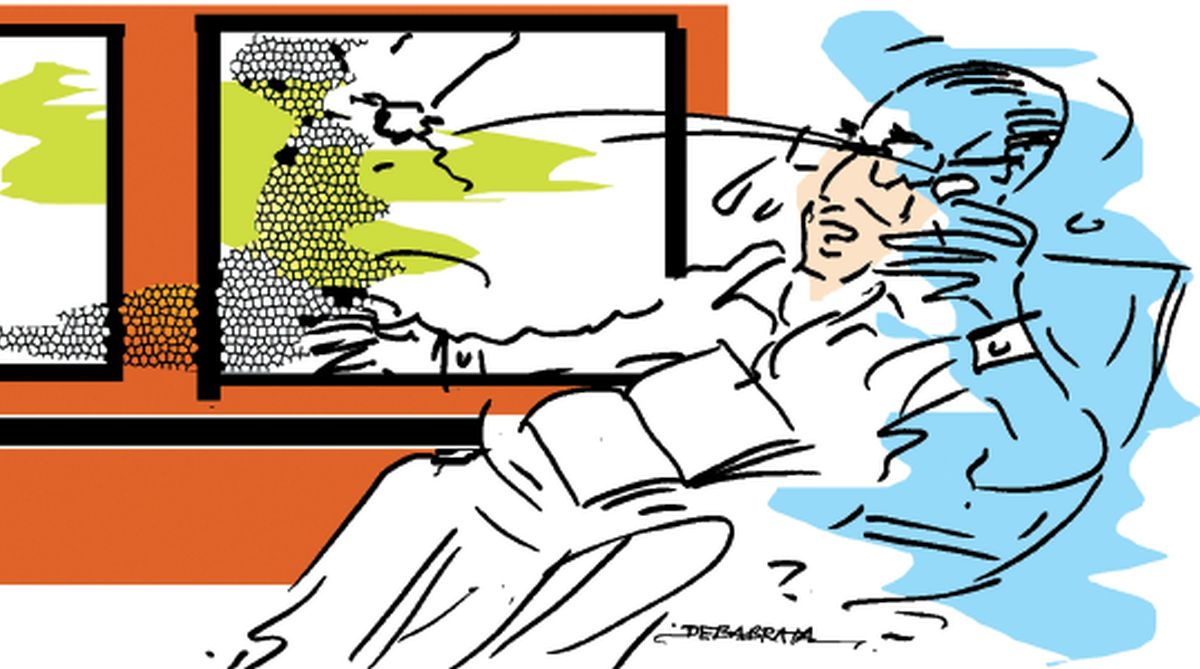My father’s friend, Dr Roy Chowdhury, a well-known scholar and writer, was travelling in a train and reading a book. A young boy, standing on the bridge in a railway station, playfully threw a stone as the train moved out. The stone went through the window, crashed his glasses and struck his left eye along with glass splinters. He went to a hospital.
When he came to our home several weeks later, my parents were aghast to see his face, an eyepatch under his new glasses. My mother nearly spilt the tea she was bringing for him. My father, greatly pained, exclaimed, “How could the boy do this to you?”
Advertisement
Dr Roy Chowdhury was remarkably calm and reconciled. He said, “The boy did what he did. Now I have to keep doing what I have always done.”
He simply took the tea from my mother’s hand and sat in the corner chair he preferred. When he saw me standing mutely next to his chair, clearly distressed, he just spread out his hand and took mine.
This happened decades earlier, but I can still see the scene vividly in my mind.
A middle-sized light-boned man, with thinning dark hair, Dr. Roy Chowdhury moved spryly and spoke in a quiet, deliberate voice. He wrote solemn books on literary figures, analyzing their social context and message. Mildness was his style; he did not speak a bellicose word or even laugh boisterously. When he placed his teacup on the saucer, you would not hear a sound.
His wife had passed away six years ago, leaving Dr. Roy Chowdhury feeling helpless as a child. Though much younger than him – she had been his student – she ran his home for him, leaving him free for his esoteric quest. She died shortly after their two sons had left home to study engineering. They cared little for literature or their father’s abstruse studies. Dr Roy Chowdhury had reorganized his life, minimized his possessions and placed all non-academic chores in the hands of a trusted domestic. He was, in short, quite alone.
If he felt lonely, he didn’t say it. He devoted himself more energetically to his work. Years later I went back to his books and tried to read them as a key to him rather than his subjects. They were clearly the result of hard work, precisely written and meticulously documented. Singularly lacking in stirring insights, they carefully analyzed the material and offered carefully worded conclusions. I was not impressed but I understood.
He was telling us, in effect, that he had found somebody worthy and delved into his or her books to find what really they were worth. He was doing no more than leaving landmarks for others to explore and come to their own conclusions.
He went through a number of surgeries to try to restore vision to his left eye. Those were long and painful, but Dr Roy Chowdhury went through those quietly and patiently. When at the end, he lost all vision in the left eye, he taught himself to work only with his right eye and determinedly went on with his work.
The next time I remember him visiting our home was when he presented his new book to my mother, “in poor exchange,” he said, “for the superb meals” she had served him. I knew the meals to have been modest, and there really had been only a few of them, but his gracious exaggeration pleased me and mother’s face was radiant.
There was no encore, for Dr. Roy Chowdhury passed away eight months later. He had, however, managed to complete his last book, except the endnotes and indices he loved to painstakingly check and re-check, to avert the slightest lapse from accuracy. There was even a handwritten memorandum of the points he wanted the publisher to observe while printing, proofing and binding the book.
The last point was that a certain employee, whose competence Dr. Roy Chowdhury trusted, should be asked to proof the manuscript. He explained that, unlike on previous occasions, he could not proof it himself as his eye, quite singular, was feeling some fatigue. That was the only reference to his accident anyone could recall.
The writer is a Washington-based international development advisor and had worked with the World Bank.











